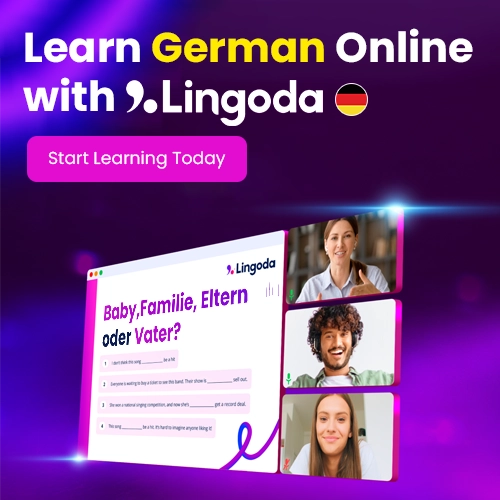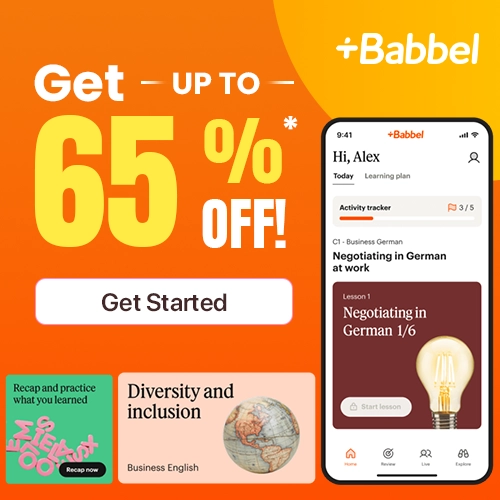
Speak the Bavarian Way: Top 5 Platforms to Learn German
- Join a pool of 15 million global learners
- Experience 20+ different dialects and accents
- Become one of the 200 million global German speakers
- Learn from over 5 million words
Lingoda
750k course per year for every learner
Babbel
Discounted award-winning language courses
Italki
Interactive visual learning methods for every need

- Over 750k German classes every year
- 60 minute live learning sessions
- 5-level learning experience
- Group and 1:1 sessions available
See More Info
Why Do We Recommend it?
- Curriculum designed by experts for flexible learning
- 60 minute live learning sessions
- Intense learning session options
- 7-day free trial to learn
- Every day German with vocabulary options

- 14- tailor made units for German
- 10-15 minute lessons for consistent learning
- Customized lessons and exercises
- Practice sessions with native speakers
See More Info
Why Do We Recommend it?
- Media learning for improved engagement
- Activity tracker to check results consistently
- Certified method to cater specific learning needs
- Instant feedback for rapid improvement.

- 3 free lessons available
- Lessons starting at $5/hour
- Practice phrases with natives
- Pay per lesson policy
See More Info
Why Do We Recommend it?
- 1:1 interaction and group classes available
- Learn anytime you want at your convenience
- 5 million+ learners in 190 countries
- 20,000+ teachers around the world.

- 50% off with back to school offer*
- 30-day money back guarantee
- Advanced tools to improve pronunciation
- Both online and offline learning features
See More Info
Why Do We Recommend it?
- Best for German language learning
- 100% satisfaction rate from the learners community
- 30+ years of teaching
- 50+ languages immersive environment for learning

- Start learning German at just $3/hour
- 24/7 learning sessions available
- Choose from 1,225 certified tutors
- International certifications available
See More Info
Why Do We Recommend it?
- Trusted by 1 million+ learners globally
- 300,000+ 5-star tutor reviews
- Corporate language training options available at great discounts
- Targeted learning approach to achieve specific language goals
The German Comparison: Lingoda, Babbel, italki, Rosetta Stone, and Preply
Learning the German language requires not only time and commitment but also choosing the right learning platform. In today’s market, there are many online platforms that facilitate learning German. In this article, we compare five popular platforms: Lingoda, Babbel, italki, Rosetta Stone, and Preply. We consider factors such as pricing, accreditation, duration, instructors, industry ratings, and user experience to help you choose the best option for your needs.
Pricing/Preise
Babbel is the most cost-effective option, with monthly subscriptions starting at just €5.
Duration/Dauer
Lingoda offers flexible course durations, from intensive daily sessions to more relaxed weekly classes.
Instructors/Lehrer
Lingoda employs qualified, native-speaking teachers with a rigorous vetting process.
Accreditation/Akkreditierung
Lingoda provides accredited courses with official CEFR certificates, making it the top choice for learners seeking formal recognition.
User Experience/Benutzererfahrung
Babbel is known for its user-friendly interface, making it an excellent choice for beginners and those who prefer a straightforward learning experience.
Industry Ratings/Industriebewertungen
Lingoda has a strong industry reputation, particularly for its structured and intensive programs.
The End: Which Platform is the Best?
Lingoda emerges as the overall winner in this comparison. It excels in most categories, particularly in accreditation, instructor quality, and course flexibility. This makes Lingoda the best choice for learners seeking a professional and structured approach to learning German, especially those who value accredited certification.
Babbel is a strong contender, especially for budget-conscious learners who prefer a self-paced learning experience. Its user-friendly platform and cost-effectiveness make it the best choice for beginners or casual learners.
Italki and Preply are ideal for those who prioritize flexibility and personalized instruction. These platforms are best suited for learners who want direct interaction with native speakers and customized lesson plans.
Rosetta Stone remains a solid option for those who prefer an immersive, self-guided learning experience and value a long-standing reputation in the industry.
Ultimately, your choice will depend on your specific needs, budget, and learning style, but Lingoda stands out as the top recommendation for most learners
Curious to know why the German language has three genders? Start learning today.
How to Choose a Language Learning Platform?
At Top10foryou, our team of experts has conducted extensive research on various platforms. We understand your needs and have prepared a list of the best platforms to guide you in making the right decision.
Our method is designed to provide you with a reliable learning path backed by our deep understanding of your needs.
Pricing: We’ve evaluated prices in our review process, ensuring we recommend the most cost-effective platforms.
Accreditation: We’ve conducted thorough research on every platform’s certifications and partnerships to ensure credibility and integrity.
Course Duration: We have closely examined the average duration to help you understand their learning flexibility.
Instructors: We have verified the instructor’s profile to make your work easy.
Platform Library: We dived deep into the content and course library to learn how many courses they offer.
Flexibility: We analyze the platform’s features, course structures, and user feedback to ensure that the platform suits learners of all levels and types.
Industry Grade Rating: Brand reputation is analyzed via credible third-party platforms, online reviews, and our editors to make sure that the platform provides value for money.
User Experience: We carefully evaluate the platform, its accessibility, support, and refund policies to ensure a seamless user experience.
Frequently Asked Questions
How long does it take to learn German?
The time it takes to learn German depends on various factors, such as your native language, the amount of time you dedicate to learning, and your learning method. On average, reaching a conversational level might take about 600-750 hours of study.
What is the best way to learn German?
A combination of methods, including attending classes, using language apps, practicing with native speakers, and immersing yourself in German media (books, films, music), is often the most effective approach.
Is German difficult to learn?
German can be challenging due to its grammar rules and pronunciation. However, with consistent practice and dedication, it is manageable. English speakers may find some similarities with German vocabulary.
Do I need to learn German grammar?
Yes, understanding German grammar is essential for constructing correct sentences and improving communication. Focus on key aspects like articles, cases, and verb conjugations.
Can I learn German online?
Absolutely! Many online resources, such as apps, websites, and virtual classes, offer flexible learning opportunities. These platforms often include interactive exercises and access to native speakers.
How can I improve my German pronunciation?
Listening to native speakers, practicing speaking regularly, and using language apps with pronunciation feedback can help improve your pronunciation. Mimicking sounds and practicing tongue twisters can also be beneficial.
Is it necessary to learn German vocabulary extensively?
Building a strong vocabulary is important for effective communication. Start with everyday words and phrases, then gradually expand your vocabulary based on your interests and needs.
Are there dialects in the German language?
Yes, there are many dialects in German, such as Bavarian, Swabian, and Saxon. Standard German (Hochdeutsch) is used in formal settings, and learning it will help you understand and communicate across different regions.
What resources can help me practice German listening skills?
Podcasts, audiobooks, German TV shows, and movies are excellent resources for improving listening skills. Try listening to content with subtitles to aid comprehension initially.
How important is cultural immersion in learning German?
Cultural immersion can significantly enhance your language learning. It helps you understand context, idiomatic expressions, and cultural nuances, making your communication more effective and authentic.
Our Best Pick







